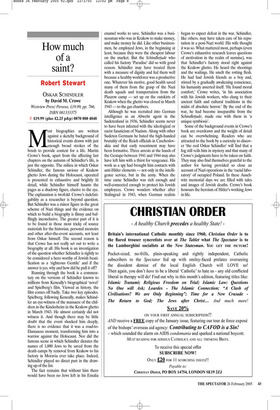How much of a saint?
Robert Stewart
OSKAR SCHINDLER by David M. Crowe Westview Press/ Perseus, ┬Ż19.99, pp. 766, ISBN 081333375 Ō£å ┬Ż19.99 (plus ┬Ż2.25 p&p) 0870 800 4848 Most biographies are written against a sketchy background of historical events drawn with just enough broad strokes of the brush to provide context for a life. Martin CroweŌĆÖs book, apart from the affecting last chapters on the autumn of SchindlerŌĆÖs life, is just the opposite. The milieu in which Oskar Schindler, the famous saviour of Krakow ghetto Jews during the Holocaust, operated is presented in exhaustive and brightly lit detail, while Schindler himself haunts the pages as a shadowy figure, elusive to the eye. The explanation is twofold. CroweŌĆÖs indefatigability as a researcher is beyond question. But Schindler was a minor figure in the great scheme of Nazi things and the evidence on which to build a biography is flimsy and bafflingly inconclusive. The greater part of it is to be found in those most tricky of source materials for the historian, personal memoirs and other after-the-event accounts, not least from Oskar himself. The second reason is that Crowe has not really set out to write a biography at all. His book is an investigation of the question whether Schindler is rightly to be considered a hero worthy of Jewish beatification as a ŌĆśrighteous GentileŌĆÖ and if the answer is yes, why and how did he pull it off?
Running through the book is a commentary on the versions of Schindler known to millions from KeneallyŌĆÖs biographical ŌĆśnovelŌĆÖ and SpielbergŌĆÖs film. Viewed as history, the film comes off badly. Take two key episodes. Spielberg, following Keneally, makes Schindler an eye-witness of the massacre of the children in the Kinderheim in the Krakow ghetto in March 1943. He almost certainly did not witness it. And though there may be little doubt that the event shocked him deeply, there is no evidence that it was a road-toDamascus moment, transforming him into a warrior against the Holocaust. Nor did the famous scene in which Schindler dictates the names of 1,000 Jews to be saved from the death camps by removal from Krakow to his factory in Moravia ever take place. Indeed, Schindler played no direct part in the drawing up of the list.
The fact remains that without him there would have been no Jews left in his Emalia enamel works to save. Schindler was a businessman who was in Krakow to make money, and make money he did. Like other businessmen, he employed Jews, in the beginning at least, because they were the cheapest labour on the market. But the Schindlerjude who called his factory ŌĆśParadiseŌĆÖ did so with good reason. Schindler may have treated them with a measure of dignity and fed them well because a healthy workforce was a productive one. Whatever his motive, good health saved many of them from the grasp of the Nazi death squads and transportation from the Plaszow camp ŌĆö set up on the outskirts of Krakow when the ghetto was closed in March 1943 ŌĆö to the gas chambers.
Although he was recruited into German intelligence as an Abwehr agent in the Sudetenland in 1936, Schindler seems never to have been infected with the ideological or racist fanaticism of Nazism. Along with other Sudeten Germans he hated the high-handed brutality of the Reich officials in Czechoslovakia and that early resentment may have been formative. Three arrests at the hands of the Gestapo between 1941 and 1944 may also have left him with a thirst for vengeance. His work as a spy had brought him contacts with anti-Hitler elements ŌĆö not only in the intelligence service, but in the army. When the time came Schindler was rich enough and well-connected enough to protect his Jewish employees. Crowe wonders whether after Stalingrad in 1943, when German realists began to expect defeat in the war, Schindler, like others, may have taken care of his reputation in a post-Nazi world. His wife thought it was so. What mattered most, perhaps (even CroweŌĆÖs exhaustive research leaves questions of motivation in the realm of surmise), was that SchindlerŌĆÖs factory stood right against the Krakow ghetto. He heard the shootings and the wailings. He smelt the rotting flesh. He had had Jewish friends as a boy and, stirred by a gradually awakening conscience, his humanity asserted itself. ŌĆśHe found moral comfort,ŌĆÖ Crowe writes, ŌĆśin his association with his Jewish workers, who clung to their ancient faith and cultural traditions in the midst of absolute horror.ŌĆÖ By the end of the war, he had become inseparable from the Schindlerjude, made one with them in ŌĆśa unique symbiosisŌĆÖ.
Some of the background events in CroweŌĆÖs book are overdrawn and the weight of detail can be overwhelming. Readers who are attracted to the book by a curiosity to discover ŌĆśthe real Oskar SchindlerŌĆÖ will find that a fog still veils him in mystery and that many of CroweŌĆÖs judgments have to be taken on faith. They may also find themselves grateful to the author for having provided so close an account of Nazi operations in the ŌĆśracial laboratoryŌĆÖ of occupied Poland. In these Auschwitz memorial days we are filled with tales and images of Jewish deaths. CroweŌĆÖs book honours the heroism of HitlerŌĆÖs working Jews in life.
















































 Previous page
Previous page